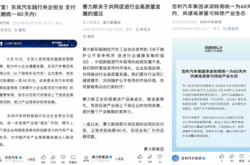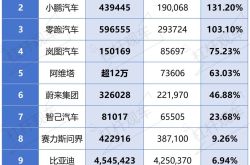Is Toread Back from the Abyss?
![]() 07/29 2024
07/29 2024
![]() 684
684

After a long absence, Toread has finally returned.
In the first half of 2024, the company's performance surged significantly, with net profit attributable to shareholders ranging from 75 million to 95 million yuan, an increase of 247.04% to 339.59% year-on-year.
However, this growth has little to do with the company's core outdoor sports business. The primary factor is the chip business acquired through recent transformations.
As one of the established giants in the outdoor products industry and the first publicly traded outdoor sports company in China, Toread embarked on a "ecosystem" style diversification transformation based on its impressive performance. Yet, a round of capital operations directly halted the company's growth trajectory, plunging it into a crisis of consecutive losses.
Even the return of Wang Jing, the company's charismatic founder, renowned mountaineer, and chief product manager, failed to restore Toread to its former glory. Disheartened, Sheng Faqiang and Wang Jing transferred control of the company to Li Ming, who led Toread on a new transformation path.

Significant Performance Boost
On July 24, Toread (300005.SZ) released its 2024 semi-annual performance forecast, reporting a net profit attributable to shareholders ranging from 75 million to 95 million yuan, an increase of 247.04% to 339.59% year-on-year. Deducting non-recurring gains and losses, net profit stood at 71 million to 89 million yuan, a surge of 449.94% to 589.36% year-on-year.
It's worth noting that Toread was still in the red last year. In 2023, the company's revenue increased by 22.10% year-on-year to 1.391 billion yuan, but its net profit after deducting non-recurring gains and losses was -55.0436 million yuan, a decline of 354.99% year-on-year.
Regarding Toread's substantial performance improvement in the first half of 2024, the company attributed it to steady growth in revenue and profit from its outdoor business, as well as a significant year-on-year increase in revenue and profit from its chip business.
Since last year, the chip business has been the primary driver of Toread's performance fluctuations, despite the company's reputation as the leading domestic brand in outdoor products.
As of the end of 2023, Toread operated a total of 893 stores under its own brands: Toread, Toread Kids, and TOREAD.X. During the year, the company net added 97 stores, a far cry from the 1,614 stores it operated a decade ago.
Discovery Expedition, a brand under the American media giant Discovery Channel, was introduced to the Chinese market by Toread in 2013 and once operated over 150 stores. During Toread's contraction phase, this brand played a stabilizing role to some extent. However, as the brand license agreement enters its transition phase and store numbers dwindle, Toread's business from Discovery Expedition has become negligible.
In 2023, Toread's primary revenue growth came from its chip business. While outdoor product revenue increased by 11.21%, chip business revenue soared from several million yuan to 133 million yuan, directly boosting the company's overall revenue growth to 22.10%.
The two primary chip businesses recorded net profits of -96.426 million yuan and 29.4637 million yuan last year, dragging down the performance of the listed company.
In recent years, Toread's outdoor product sales have grown limitedly, with gross margins trending downwards. The hope for future growth rests solely on the chip business, but it remains to be seen whether this new business can propel Toread into a new cycle.
Over the past decade, Toread has been on a rollercoaster ride of performance. Listed in 2009, the company enjoyed rapid growth for several years before entering a downturn in 2015 and slipping into losses from 2017 onwards. After years of struggling, the company has gradually recovered in recent years.
Behind these ups and downs lies Toread's arduous transformation journey.

Transformation Redux
In 1999, Sheng Faqiang and Wang Jing co-founded Toread. The company was among the first batch to list on the ChiNext in 2009, and with capital backing, it grew into a leader in China's outdoor products industry.
However, the outdoor products segment gradually became insufficient for Toread, which was then considered a niche market. Shortly after going public, the company encountered a downturn in the footwear and apparel market, and outdoor products were not spared. Based on internal and external factors, Toread embarked on a diversification transformation.
Under the leadership of Sheng Faqiang, then Chairman and CEO, Toread segmented its core outdoor products market into three major segments: professional outdoor sports, outdoor leisure products, and outdoor products e-commerce.
In subsequent years, Toread made strategic investments in companies such as Lvye, Tutoo, Eyou World, and Xingzhi Exploration with the help of capital, and directly or indirectly invested in fields like ice and snow sports, event operations, sports media, and sports training.
Toread was no longer content with merely selling outdoor products; instead, it gradually built an "ecosystem" comprising outdoor products, travel services, and sports.
In 2015, the company's revenue soared from the previous several years' 1 billion yuan level to over 3.8 billion yuan. However, this was also the period when the company's performance began to decline, leading to consecutive losses.
Amid the crisis, Wang Jing returned to take the helm of Toread at the end of 2017, proposing a "return to the outdoor products business as the core," and implementing a comprehensive strategic retreat.
In the outdoor products segment, Toread focused on its two major brands, Toread and Discovery Expedition, while divesting new brands and business lines like Acono. As for the "ecosystem," Toread made more drastic moves, exiting Tutoo, Eyou World, and Lvye International Travel, and revitalizing related businesses like Lvye.com and Liuzhijiao.
After a series of adjustments, Toread stabilized its position but failed to regain its former glory. In 2020, the company plunged into losses again due to adverse external conditions.
In 2021, Toread embarked on another transformation journey, acquiring Beijing Xineng, a chip design company in the display field, for 260 million yuan. In 2023, it invested another 378 million yuan to gradually take control of G2 Touch, a touch chip design and R&D company, and Jiangsu Dingmao, a chip testing and packaging service company, forming a small-scale chip industry chain and establishing a dual-mainstay business model of outdoor products and chips.
Founders' Departure
Behind Toread's business transformations and performance fluctuations lies a path of power shifts.
After Toread's listing, co-founder Wang Jing retreated from daily management, serving only as a director and product development technical advisor. The company was left in the hands of her husband, Sheng Faqiang.
This female mountaineer had bigger dreams of her own.
Wang Jing has successfully climbed mountains over 8,000 meters ten times and Mount Everest four times. In particular, in 2014, she completed the Nine Poles of the Earth (the highest peaks of the seven continents plus trekking to the North and South Poles) in 142 consecutive days, becoming the fastest person in the world to accomplish this feat at the time.
"Men should do something adventurous in their lives, and I believe women can too," reads a quote from the cover of Wang Jing's mountaineering documentary, "A Road to the Clouds."

As Toread's founder and chief product manager, Wang Jing conquered the world's peaks, wrote, and filmed documentaries during her years away from company management, reinforcing the brand from another angle.
When Sheng Faqiang's outdoor user "ecosystem" plunged Toread into crisis, Wang Jing had to put aside her dreams of stargazing and return to the company to save it from collapse.
After several years of maneuvering, Toread preserved its listed status but never regained its former stature.
In 2020, Sheng Faqiang and Wang Jing made up their minds to step down, transferring actual control of the listed company to Li Ming and no longer holding relevant positions. This led to Toread's transformation into the chip business.
Who would have known that after a few exceptional years, outdoor activities like camping, cycling, hiking, and mountaineering gradually became lifestyles, propelling the outdoor sports industry into the limelight and experiencing significant growth. However, Toread was ill-prepared, and it was original supply chain players and new consumer brands that seized market opportunities instead.
In recent years, financially secure Wang Jing has lived a leisurely life, often sharing her exhibitions and business events on her personal microblog with over a million followers, @FeixueJingjing.
However, Wang Jing probably still harbors some regrets. Her microblog introduction still lists her as the founder and chairman of Toread.








